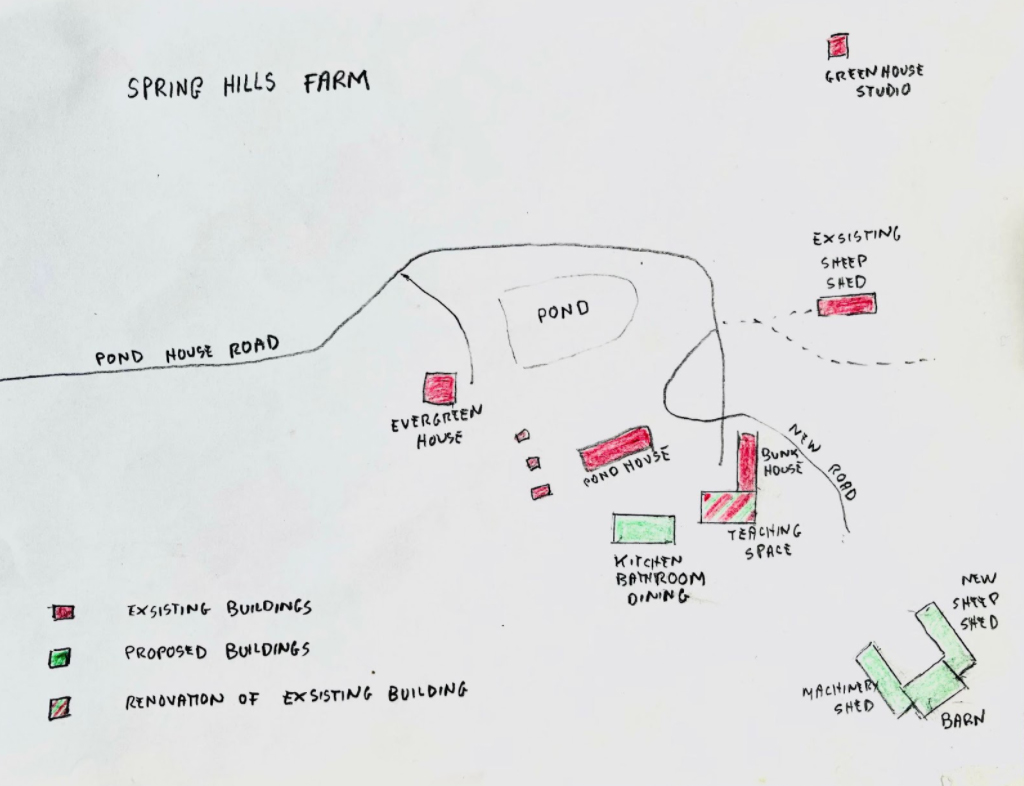Our Plan:
Expansion of Programming
The Spring Hills Foundation is working with Spring Hills Farm to substantially expand the programming to reach a larger local and regional audience. The plan provides a variety of enriching nature-based experiences for a broad array of people in the areas of living in harmony with the environment, sustainable agriculture, and the Arts. We anticipate a significant expansion of programming, while maintaining the core values of the farm–welcoming all people, immersion into nature, being in harmony with the land, and understanding our world through the cognitive and the intuitive. The following is a representative listing of the kinds and scale of programming that we hope to support. All of this programming will be centered around an immersion in nature, and will follow the guiding principles of the Farm.
Programming for young school children in the summer to expose and immerse them into the natural environment and sustainable agriculture.
Programming for high-school students to expose and immerse them in the Farm’s cycles of nature.
Programming for adults on a variety of topics, including re-generative agricultural techniques relevant to northeastern Pennsylvania.
Support 10 or more artist workshops each year, and expand from painting to other modalities–music, writing, theater–and also combinations, such as painting/musical performances/music composition.
The Foundation plans to engage with like-minded educators who understand how the Farm can provide a launching pad for additional experiential, nature-based programming. We also plan to collaborate with other organizations, to collectively leverage our combined strengths, and provide new resources that involve sharing the Spring Hills Farm and other working family farms with diverse audiences.
Expansion of Infrastructure
A key Foundation goal is to help the Farm expand and repurpose its present infrastructure to fulfill the vision of expanded programming. The three significant initiatives to be undertaken are:
Convert the existing toolshed into a four season multi-purpose educational space.
Build a new barn complex to house the sheep and horses in a location where key environmental needs will be met.
Create a kitchen and dining hall, to enable catering for program participants, and to support education in food preparation using locally sourced produce.
The educational space will be configurable to support a wide variety of programming. For example, it can be set up as a classroom and experimental lab for school-age children. It can also be configured as an artist studio, enabling multiple visual artists to work on week-long projects. Finally, it can be used as a performance space, e.g., for music or theater, supporting teaching, rehearsals, and performances.
The new barn complex will address several interrelated environmental concerns and support educational programming about them. The existing sheep shed is very close to the drainage swale running from north to south through the middle of the Farm that feeds Kennedy Creek. Sheep waste is polluting the Creek and the swale that feeds it, two of the ponds on the Farm, and more broadly the downriver Chesapeake Bay Watershed. At present hay storage for the Farm is located at the northern end of the Farm, a good two miles away from the existing sheep shed. This means transporting hay creates a substantial carbon footprint. To mitigate both environmental issues the Foundation will help the Farm build a new barn complex located near the Timothy hayfield.
The new barn complex will have three components: a hay storage area, new housing for sheep and horses, and a workshop and machinery shed for tools and equipment storage. The new barn will be located far from the north-south drainage swale, so that the sheep waste no longer pollutes the watershed. The animal housing area will be large enough to enable animal husbandry education such as lambing and sheep shearing. The new workshop will house tools and equipment from the existing workshop located near the Pond House. The existing workshop will be converted to an expansive educational space for classes and activities in the areas of sustainable agriculture, living in harmony with the environment, and the Arts.
The kitchen and dining hall will complement the programming on the Farm, by enabling participants to stay for long continuous periods, thereby deepening their sense of immersion into nature. It will also be used to host a variety of programming for both children and adults in the areas of meal preparation and food preservation.
An important first step of this infrastructure expansion was completed in Fall 2021, namely, a new road giving access to the proposed new barn, along with a substantial water drainage system.
The map below shows the approximate locations of the new road and the existing, proposed and repurposed buildings in relation to the Pond House.

2022 Goals
In order to create the new infrastructure the Foundation set has four goals for 2022. These are:
Fundraising through our annual campaign that will reach previous donors and individuals
-
Completion of grant applications
-
Commission a Master Plan and Sewage Management Plan for the new infrastructure. This will include complete architectural plans and final costs of the full project
-
Groundbreaking on the barn complex (Margaret’s Barn) that will establish the blueprint / foundation to build each component of the barn (Sheep, Horses, Tools and Maintenance, Hayloft/Storage, classroom)